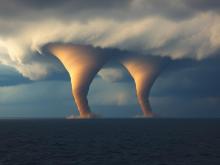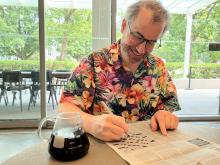An eminent UBC evolutionary biologist whose early work focused on Charles Darwin's famous Galápagos Island finches has been named to one of the world's most prestigious honorary societies.
Dolph Schluter, professor and Canada Research Chair in Zoology, was elected to the American Academy of Arts and Sciences today. He joins the ranks of some of the world's most accomplished leaders from academia, business, public affairs, the humanities, and the arts.
“Election to the Academy is both an honor for extraordinary accomplishment and a call to serve,” said Academy President Leslie Berlowitz. “We look forward to drawing on the knowledge and expertise of these distinguished men and women to advance solutions to the pressing policy challenges of the day.”
Schulter’s research focuses on adaptive radiation—the evolution of ecological diversity in groups of organisms that are multiplying rapidly. His lab investigates the ecological forces that drive the rapid origin of new species and allow them to persist, the genetic basis of species differences, and the wider ecological impacts of adaptive radiation.
Currently president elect of the American Society of Naturalists, Schulter was awarded the Society’s Sewall Wright Award in 2007. He is a Fellow of the Royal Society of Canada, a Guggenheim Fellow, and was awarded the 2006 Rosenblatt Award by the Scripps Institute of Oceanography.
Founded in 1780, American Academy of Arts and Sciences is also a leading center for independent policy research. Members contribute to Academy publications and studies of science and technology policy, energy and global security, social policy and American institutions, the humanities and culture, and education.
The new class will be inducted at a ceremony on October 6 at the Academy's headquarters in Cambridge, Massachusetts. UBC medical geneticist Philip Andrew Hieter was also among 220 new Academy members announced today.
Schluter is the fifth UBC Science researcher to be named to the Academy. Mathematician Donald Ludwig, evolutionary biologist Loren Rieseberg, physicist William Unruh, and physicist and educator Carl Wieman, are all members.
Musqueam First Nation land acknowledegement
We honour xwməθkwəy̓ əm (Musqueam) on whose ancestral, unceded territory UBC Vancouver is situated. UBC Science is committed to building meaningful relationships with Indigenous peoples so we can advance Reconciliation and ensure traditional ways of knowing enrich our teaching and research.
Learn more: Musqueam First Nation
Faculty of Science
Office of the Dean, Earth Sciences Building2178–2207 Main Mall
Vancouver, BC Canada
V6T 1Z4


